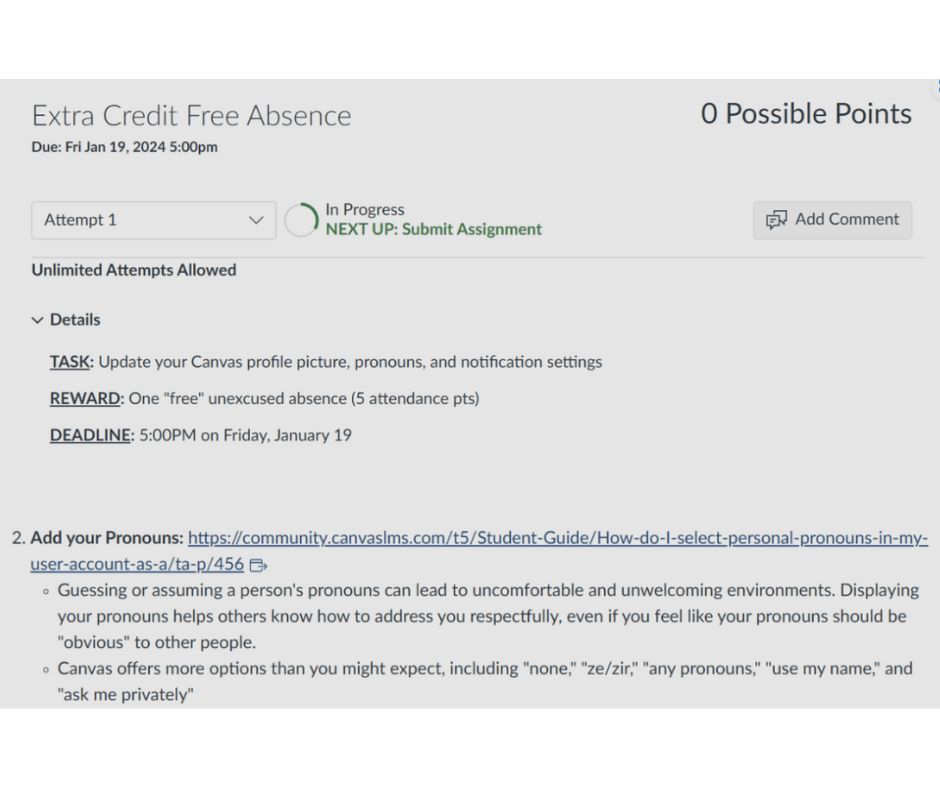
‘Displaying your pronouns helps others know how to address you respectfully, even if you feel like your pronouns should be ‘obvious’ to other people’
The University of Florida told The College Fix it does not believe in “policing pronouns” in response to a report that one of its professors was offering extra credit to students who displayed them in their class profile.
Associate Vice President for Communications Steve Orlando provided the comments in response to a Fix inquiry about extra credit Professor Autumn McLellan gives students in at least one of her classes.
“Academic credit is to be awarded for academic work, and policing pronouns doesn’t cut it,” Orlando told The Fix via email on Friday. “The administration has made this clear.”
The sociology professor gave students until next Friday, Jan. 19 to update their profile on Canvas, a class software used by the university.
“Guessing or assuming a person’s pronouns can lead to uncomfortable and unwelcoming environments,” the sociology professor (pictured) told students in the online assignment, as first reported by Young America’s Foundation. “Displaying your pronouns helps others know how to address you respectfully, even if you feel like your pronouns should be ‘obvious’ to other people.”
Students are also asked to include a profile picture and update their “notification settings” in order to get the extra credit, which is equal to the value of taking a day off from class.
“Canvas offers more options than you might expect, including none, ‘ze/zir,’ ‘any pronouns,’ ‘use my name,’ and ‘ask me privately,” a photo of the assignment shows.
She did not respond to a College Fix request for comment sent on Thursday. The Fix asked why it was important for students to include their pronouns and how she would respond to a student who declined to offer them.
The university also told The Fix:
This is pretty simple: The University of Florida is not in the business of compelling students to speak and discriminating against those who don’t. We believe in the First Amendment, and we know Florida taxpayers pay our bills so that we can focus on serious academic work — not pushing students to disclose their pronouns. If students want to disclose pronouns, that’s their business. And, if students don’t want to disclose pronouns, that’s their business. It’s our business to treat everyone with respect and focus on our mission to educate.
McLellan’s research interests include “Collective Action/Social Movements,” “Stratification/Inequality,” and “Social Psychology,” according to her university website.

She also has spent time studying and working with pre-teens to learn about sex and race, according to her curriculum vitae.
While at the University of North Carolina at Chapel Hill, where she obtained her doctorate, McLellan taught a class called “Race, Class, and Gender.” The course had a “special focus on early childhood development of gendered and racialized identities, historical and contemporary experiences of working class Black Americans, and Latin American immigration experiences.”
A “service learning” version of the course “matches adults with local adolescents (7-14 years old) and accrue at least 45 contact hours, instructional focus on learning and applying Positive Youth Development (PYD) framework, early childhood development of gendered and racialized identities, and qualitative data collection and analysis techniques,” according to her CV.
MORE: Major news network offers guide to ‘neopronouns’
IMAGES: University of Florida; Young America’s Foundation
Like The College Fix on Facebook / Follow us on Twitter




Please join the conversation about our stories on Facebook, Twitter, Instagram, Reddit, MeWe, Rumble, Gab, Minds and Gettr.